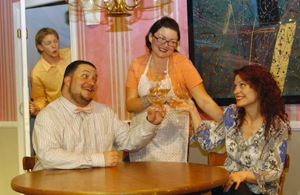-
- Dodd weighs in on same-sex marriage in N.H.
- N.Y.C health officials ask gay rights groups to discuss circumcision with members
- Wyoming lesbian couple denied Communion over their public stand
- Richardson signs medical marijuana bill
- N.Y.C. gives away 5 million official condoms in first month
- Lawmaker’s fight highlights same-sex custody muddle in N.C.
- National News Briefs
- World News Briefs
Arts & Entertainment
Of shoes and murder, sexual abuse and finding justice
'How I Learned to Drive', 'Twelve Angry Men' and 'If the Shoe Fits' reviewed
Published Thursday, 12-Apr-2007 in issue 1007
How I Learned to Drive
Li’l Bit (Michelle Procopio) got more than driving lessons from her Uncle Peck (Jude Evans). Her father out of the picture, Li’l Bit easily fell under his influence as friend and teacher.
One day when she was 11, Uncle Peck put her on his lap so she could turn the wheel while he drove. But he didn’t drive, and soon she felt his touch and heard him moan.
“That day was the last day I lived in my body,” she reports.
Paula Vogel, one of contemporary theater’s most original voices (she also wrote The Long Christmas Ride Home, currently at Diversionary Theatre), takes on the effects of child sexual abuse in the Pulitzer Prize-winning How I Learned to Drive, playing through May 6 at Lynx Performance Theatre Space, directed by Al Germani.
Sexual abuse is a heinous crime, but Vogel doesn’t take the easy road by portraying Uncle Peck as a monster. Rather, Peck’s quiet, even comforting demeanor makes the seduction seem almost natural, and magnitudes more horrible.
The script is not chronological; it begins when Li’l Bit is about 40, but concentrates on ages 11 to 18, when she overcomes the past by geographical escape, even managing to forgive. Scene changes are delineated by spoken driving instructions. Aside from Li’l Bit and Peck, Vogel has three characters she calls Greek Chorus (Krista Bell, Allie Dana and Kevin Koppman-Gue) playing a variety of roles, including Peck’s wife Aunt Mary, Li’l Bit’s mother, grandmother and grandfather, and various other characters. Germani has added a separate character he calls Li’l Girl (Alicia Randolph), portraying Li’l Bit as a young girl.
How I Learned to Drive is about abuse and forgiveness, psychology and family dynamics, weakness and inner strength. Vogel’s nonlinear approach intersperses humor (as when the three women discuss men and sex) and ’60s songs (which, to my mind, don’t help) with Li’l Bit’s story.
Procopio is heartbreaking as Li’l Bit and Evans’ Peck both mesmerizing and horrifying. Bell and Dana are fine in their various roles. I would have preferred Koppman-Gue to vary his voice a bit more (I thought his Grandfather was perhaps Li’l Bit’s brother), and Randolph could use diction lessons.
Vogel’s approach is unusual enough to make her an acquired taste, but what she has to say is always important.
How I Learned to Drive plays through May 6 at Lynx Performance Theatre Space, 2653-R, Ariane Drive. Shows Friday at 9 p.m.; Saturday and Sunday at 8 p.m. For tickets, call 619-889-3190 or e-mail theatre@lynxperformance.com.
Twelve Angry Men
The life of a 16-year-old boy accused of murdering his father with a switchblade hangs in the balance as a jury decides his innocence or guilt.
But it’s the reliability of eyewitness testimony and the “beyond a reasonable doubt” legal standard that are really on trial in Reginald Rose’s reworked 1954 “Studio One” TV drama Twelve Angry Men, playing onstage through May 6 at the Ahmanson Theatre in Los Angeles.
It’s a period piece – you won’t find a jury of 12 white men these days nor prejudice so blatantly expressed in the jury box. And the statistical unlikelihood of the result is overwhelming. But as drama, it can’t be beat.
Director Scott Ellis’ 2004 New York production has been recast for this road show. This version stars George Wendt (“Cheers”) as the jury foreman and Richard Thomas (“The Waltons”) as the lone “not guilty” holdout.
Those old enough to remember the original, or who have seen the classic 1957 film with Henry Fonda, George C. Scott, Ed Begley and a host of other Hollywood greats, can rest assured that this cast does the script justice.
The play takes place entirely in a stuffy New York jury room (wonderfully designed by Allen Moyer), where sweat drips, tempers flare (occasionally into near violence) and psyches are exposed as the jury decides between acquittal and the mandatory death penalty.
Though Wendt and Thomas get top billing (and applause) at first appearance, – a tradition that should die instantly – this is a real ensemble piece of disparate but identifiable characters who would likely not choose to party together, but who are now asked to come not just to consensus but to unanimity. They are identified only by number. Jurors Three (Randle Mell) and Ten (Julian Gamble) are the loudmouthed bigots; Juror Eleven (David Lively) a German immigrant; Juror Nine (Alan Mandell) an elderly gent whom life has passed by; Juror Seven (Mark Morettini) just wants this to end so he can get to the baseball game. Together with the others, they represent a typical ’50s jury.
The prosecution depends on two eye witnesses, “sure” of what they saw, but under conditions that cast doubt – reasonable doubt – about their certainty. The life of the accused depends on the likelihood that the witnesses saw what they reported.
What the script lacks in subtlety it makes up in drama and the sheer ability to keep an audience riveted. In my audience, there was even applause when an ill-mannered juror was called to account by another. Few plays can claim that level of audience involvement.
The program cover touts Twelve Angry Men as “the greatest courtroom drama of all time.”
It might be just that.
Twelve Angry Men plays through May 6 at the Ahmanson Theatre in Los Angeles. Shows Wednesday through Saturday at 8 p.m.; Sunday at 7:30 p.m.; matinees Saturday and Sunday at 2 p.m. For tickets, call 213-628-2772 or visit www.taperahmanson.com.
If the Shoe Fits
Marvin (Eddie Vandiver) and Delores (Nicole Brokow) are a sickening couple. The baby talk, cutesy-poo nicknames and fawning all over each other are seriously nauseating, especially if you’re there for dinner.
Then again, shoe salesman (and dinner guest) George (Brian Mackey), who calls shoes “lingerie for the feet” and admits that “I meet married women every day, but I’ve only fallen in love with four of them,” doesn’t seem like much of a catch either.
Delores and George, contrary to first appearances, are playing the old “how can we get rid of Marvin and run off together?” game, coming up with poison as a viable possibility.
Then there’s the maid Esperanza (Faeren Adams), charging through like a tornado every now and then with her heavy Spanish accent and an uncanny facility for showing up at the wrong time.
This unsavory foursome jokes and schemes, talks divorce, murder and arches in If the Shoe Fits, a new comedy by local actor Matt Thompson, Matt Chiorini and Dana Vermette, onstage at Coronado Playhouse through April 22. Thompson directs.
If the Shoe Fits has elements of farce, parody and sitcom with lots of sight gags thrown in, but mostly it’s just a very silly piece of fluff, eminently forgettable but wonderfully presented.
Adams lights up the stage with every outlandish entrance, and the treacherous trio (Vandiver, Brokow and Mackey) work hard at taking the script to its silly limit with exchanges like this between George and Delores:
George: “We could throw him off the roof.”
Delores: “It’s concrete.”
George: “That would be the last thing that goes through his head.”
But what this script needs most is a large transfusion of wit.
If the Shoe Fits has been extended through April 22 at Coronado Playhouse. Shows Thursday through Saturday at 8 p.m.; matinee Sunday at 2 p.m.; two additional matinees April 14 and 21 at 4 p.m. For tickets, call 619-435-4856 or visit www.coronadoplayhouse.com.
|
|
Copyright © 2003-2025 Uptown Publications



